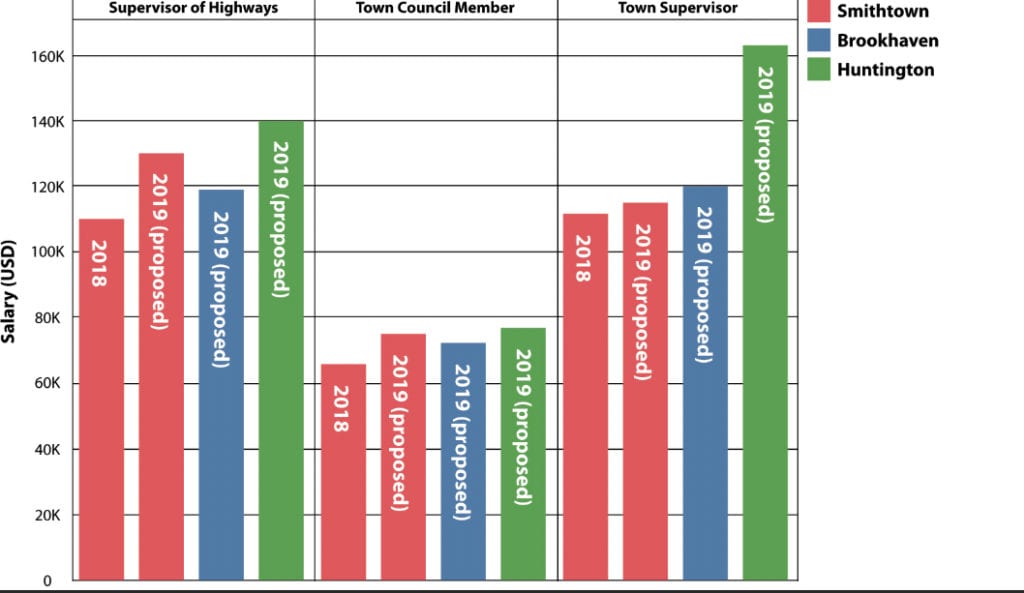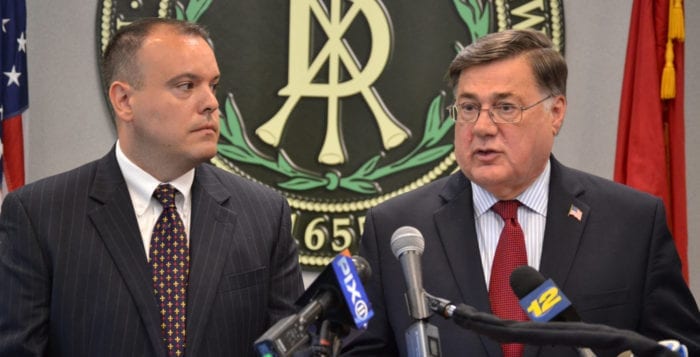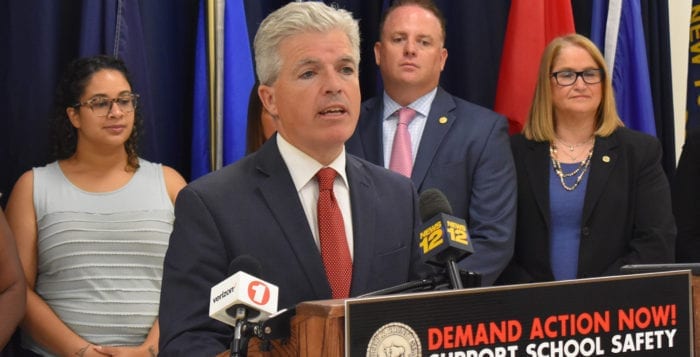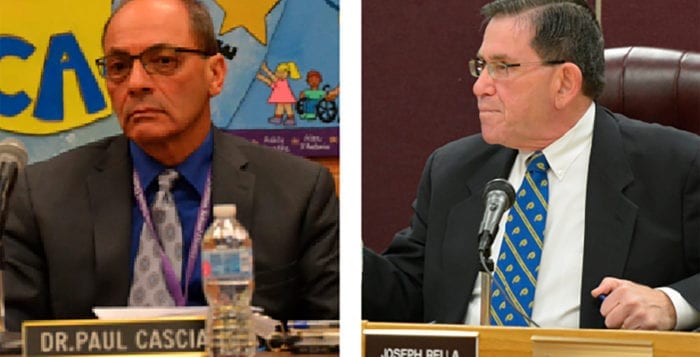Democrats and Republicans in the Suffolk County Legislature are at each other’s throats over funding for a series of bonds, including for public safety initiatives, that failed to pass at the June 19 legislature meeting.
“The Republican caucus put politics ahead of public safety,” county Executive Steve Bellone (D) said at a press conference June 20. “We saw a group of seven Republican legislators put their own politics over the interests of their constituents, of public safety, of teachers and students.”
At the June 19 meeting, three out of four bond resolutions failed to garner support from at least 12 legislators, which would represent the two-thirds support necessary to pass a bond resolution. The seven members of the Republican minority caucus voted against the resolutions. The three failed bonds included 14 items that would have provided funding for county parks, correctional facilities, public safety initiatives, road reconstruction and more.
Republican legislators said they voted against the bonds because they did not want to feel forced to vote on items they might disagree with in the future, lumped with items they were comfortable supporting now.

“We shouldn’t be paying these things off for 30 years because it’s just not fair to young people.”
— Rob Trotta
“The blame for the failure of this bond rests squarely on the shoulders of Steve Bellone,” said Minority Leader Legislator Tom Cilmi (R-Bay Shore). “Last month the county executive abandoned 40 years of history and precedence in Suffolk County… in an effort to bully the legislature into every one of his proposals.”
Bonds traditionally had not been grouped together by the Suffolk Legislature.
Legislator Rob Trotta (R-Fort Salonga) said he opposed the resolutions in part because bonding for each of the 14 projects would increase the country’s deficit.
“What we’re doing is increasing debt,” Trotta said. “We shouldn’t be paying these things off for 30 years because it’s just not fair to young people.”
Legislator Sarah Anker (D-Mount Sinai) sponsored a bill that would allocate funds for a Rails to Trails project from Wading River to Port Jefferson. That bill was included in a larger bond proposal at the June 6 legislative meeting, and that too was voted down by the Republican caucus.
“I hope they can get this resolved soon because it’s basically hindering government,” Anker said. “The county has to bond for these sorts of projects – that’s why we have this sort of process.”
Anker said the $8 million Rails to Trails project was to be funded by that bond and then the county would be reimbursed by the federal government, but without the bond the county is now looking for different revenue sources so it would not have to push back plans to start building the trail by spring 2019.
The most contentious item amongst the recent three defeated bonds was $2 million in funding for licensing Rave Panic Button mobile app, a downloadable application that acts as an instant call to fire and emergency services as well as police in an emergency, specifically a school shooting, for school and government employees.
The Rave app is currently active in 95 percent of county facilities with 20 percent of county employee phones now equipped with the app, according to Joel Vetter, the county Emergency Medical Services coordinator. The program is already in place in 19 school districts with 10 enabled devices per building. The funding, Vetter said, would have put the app in the hands of all current school administrative and teaching staff in all county school districts.
“This means that if the cellular system is down, you could contact emergency services through WiFi,” Vetter said.
Bellone defended the lump bonding, saying it’s a practice used in town and local governments across the state. He said the public safety initiatives would have saved district schools more than $1 million since each would not have to pay for it themselves.

“This has become the worst of our politics.”
— Duwayne Gregory
“If we back down from this outrageous conduct now, they will continue to hold hostage every important investment on the environment, on public safety, on roads, on parks — and we’re not going to allow that to happen,” the county executive said.
Cilmi contended that bundling the bonds together does not save money because the county’s bond council, New York law firm Harris Beach PLLC, does not charge for bond preparation.
The contract between Suffolk and Harris Beach, signed by the county in 2014, reads that there shall be no fee paid by the county related to the preparation of county resolutions, which includes bonds.
Cilmi and Trotta both said they could come close to guaranteeing funding for the Rave app would be approved as a stand-alone measure.
Democrats accused the Republican caucus of being hypocritical as the bond vote was all for items those legislators have already supported in the recent past.
“This has become the worst of our politics.” Presiding Officer DuWayne Gregory (D-Amityville) said. “Nobody gets 100 percent of what they want, and when they say, ‘we’re going to vote against a package to other bills regarding funding for our correctional facilities,’ saying ‘I don’t like one or two parts of the bill and I’m going to vote against,’ is just ridiculous.”
Bellone said he expects to put the bonds back up for vote in the next legislative meeting July 17, but he did not give specifics about whether or not the county would try and repackage the bills to be more favorable to the wishes of the Republican caucus.
Deputy County Executive Jon Kaiman (D) said if the bond vote fails again the app will not be available to districts until after school reconvenes in September.
“We have to regroup and think what kind of strategies we have going forward,” Kaiman said. “When you fail a vote the process takes a lot of time to come back.”

















